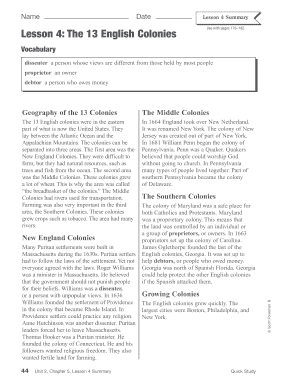Loading

Get Lesson 4: The 13 English Colonies
How it works
-
Open form follow the instructions
-
Easily sign the form with your finger
-
Send filled & signed form or save
How to fill out the Lesson 4: The 13 English Colonies online
This guide provides clear instructions on how to complete the Lesson 4 form focused on the 13 English Colonies. By following these steps, users can efficiently navigate the form to submit their information online.
Follow the steps to fill out the Lesson 4: The 13 English Colonies form online
- Locate and select the ‘Get Form’ button to access the Lesson 4: The 13 English Colonies form and open it in the appropriate online editor.
- Begin with the 'Name' field. Enter your full name as required.
- Next, fill in the 'Date' section. Ensure you use the current date or the date you are completing the document.
- Move to the 'Lesson 4 Summary' area. Review the summary provided and ensure you understand the context of the lesson.
- Proceed to the 'Vocabulary' section. Familiarize yourself with the key terms such as 'dissenter,' 'proprietor,' and 'debtor' and ensure you can explain them if necessary.
- In the 'Geography of the 13 Colonies' section, make notes or answer prompts based on the descriptions of the New England, Middle, and Southern Colonies.
- Complete the 'Lesson 4 Review' questions. Provide thoughtful answers to each question, ensuring you reflect on the material you have studied.
- Once all sections are complete, review your entries for accuracy. Save your changes.
- Finally, choose to download, print, or share your completed Lesson 4 form as needed.
Get started today and fill out your Lesson 4 document online!
The 13 British colonies that eventually became the United States in some ways were more different than they were alike. They were founded for a diverse range of reasons— from the pursuit of fortunes to the desire to create havens from persecution and model societies and had differing systems of governance.
Industry-leading security and compliance
US Legal Forms protects your data by complying with industry-specific security standards.
-
In businnes since 199725+ years providing professional legal documents.
-
Accredited businessGuarantees that a business meets BBB accreditation standards in the US and Canada.
-
Secured by BraintreeValidated Level 1 PCI DSS compliant payment gateway that accepts most major credit and debit card brands from across the globe.


